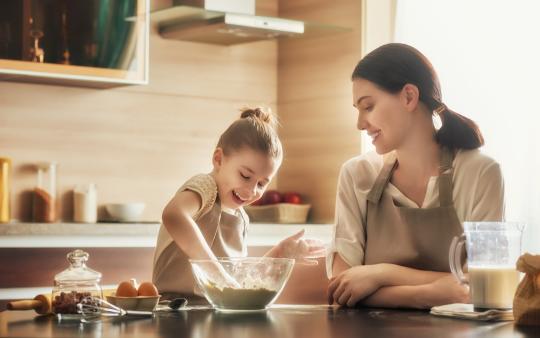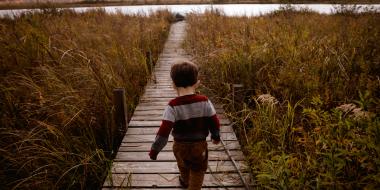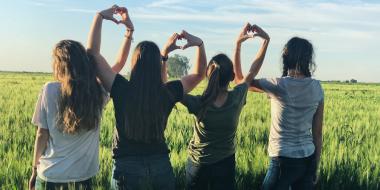Life skills are increasingly being lost in favour of the technical skills required for smart phones, computers, and social media. In a culture that is always on the go, buys too much, and never has enough time, possessing simple, sustainable life skills is advantageous in so many ways.
If you teach kids practical skills they will:
- Learn problem-solving, resilience, independence, and self-sufficiency
- Save money by not having to hire out for help
- Create memories and traditions (and items) that have the potential to be passed down through generations
- Feel empowered by the pride and sense of accomplishment of being able to do and create things on their own
- Learn the associated sub-skills required to achieve these life skills
- Create less waste
Here are 11 sustainable life skills caregivers can teach that are integral to raising capable, resilient children!
Cooking
Helping out in the kitchen can be modified to get a child of any age involved. This is an amazing opportunity to educate your family about the importance of consuming a healthy diet and reduce the demand for processed food and take-away. Get things started at the market or grocery store by allowing your kids (even babies!) to choose what fruits, vegetables, or protein source they want for the meal. Having them involved in this step also makes them more likely to actually eat it. Don't worry too much if you have a “unique” looking fruit in your cart! The internet is a great resource for explaining how to cut pretty much anything.
As they grow, they should learn how to measure, pour, stir, mash, and follow a basic recipe. With help, they can eventually learn to chop safely. It is quite simple to create your own ingredients list and step-by-step instructions, even if it’s just to boil an egg. Adding photos to each of those steps will make it even easier. Here is an opportunity to learn about following instructions, numbers, fractions, and much more.
Kitchen safety should also be discussed. Talk about how to safely use kitchen equipment like knives, mixers, and graters, and what you would do if there was a fire.
Foraging
Just playing out in Mother Nature, going barefoot, and breathing fresh air are habits we ought to start teaching our children early. They spend so much time indoors these days that they are forgetting how to play, discover, and deal with or figure their way out of boredom. We are surrounded by free, healthy foods in our forests and possibly backyards, and yet the art of wildcrafting botanicals has been lost. You can learn as a family how to take advantage of these wild edibles while benefiting from being in nature. Just some of the wild foods found in North America are:
Vegetables
Wild leeks, fiddleheads, dandelion, wild asparagus, wild ginger, wild mint
Fruits
Crab apples, blackberries, mulberries, raspberries, elderberries
Mushrooms
Lots! But seek professional guidance as some safe varieties are easily confused with the similarly appearing poisonous species.
Medicinals
Plantain leaf, nettles, Joe-Pye weed, burdock
Check out your local library or an online resource to help discover the plants and how to use them. Involve the entire family in seasonal harvesting for items that can be found in your area and never eat anything you cannot definitely identify.
Gardening
Gardening is a sustainable life skill that also shows how caring for something living and watching it grow from seeds can be rewarding. This is an opportunity to provide your family with food that is as local and as fresh as it gets! It also exposes them to important soil microbes that are found locally in your unique environment and which bolster your immune system. Plants that will easily start from seeds indoors include: peas, beans, spinach, lettuce, tomatoes, and carrots.
As kids grow they can take on more responsibilities such as watering, composting, pulling weeds, raking, and using the lawn mower. The more your children grow, the more nuanced information you can share such as soil nutrition or how there are various types of the same plant species.
Preserving & Fermenting
Even young kids can help prepare food for storage. Allow children to help wash, cut, and learn about the importance of sterilization techniques in preserving foods. Educate them about the various ways to preserve foods such as drying, canning, and freezing. You can teach them about reducing waste by freezing unconsumed foods before they go bad. Not only does this open the conversation about sustainable living, it also teaches them the sustainable life skill of being kind to the environment. By preserving foods, you teach your children to rely less on other environmental resources used in commercial food production.
The research supporting the health benefits of consuming fermented foods is plentiful. Kombucha, kefir, sauerkraut, and ginger bugs are all fun and healthy home projects that kids can enjoy making and tasting. Take a class in your community, research reputable online resources, or ask family and friends to teach you so you can learn these skills if you don't know them already. (Even adults can learn new life skills!)
Sewing
Everyone should know the basics of sewing. Many retail items are a full 50% off just because they are missing a button! All kids should know how to thread a needle, sew on a button, fix a hole in a sock, and use a sewing machine. Knowing how to hem pants and shirts can save time and money and allow them to enjoy their new threads almost immediately! Learning these skills may open a window of opportunity for children who take a special interest in it—the next thing you know, they’ll be making their own Halloween costumes! Knowing this sustainable life skill also wards off the pesky question, “Where does all the used clothing go?”
Carpentry
Next time you are assembling or repairing any type of furniture, get the kids involved. Call the tools by their proper names and model how to use them. Verbally explain what you are doing and why. As they grow, provide them with building materials and tools and give them the task of building something, complete with hammering, sawing, sanding, and painting. These practical and sustainable life skills will enable them to restore and repair older furniture and perform home projects, reducing consumption and landfill, and enabling them to enjoy favourite pieces for a much longer time.
Sustainable Living
Yes, it’s a life skill! In a materialistic, economically unstable world, a very important sustainable life skill to teach kids is how to live creatively and comfortably with fewer things on less money. Model for your children how to value what you have and take care of your items to ensure they last. Focus on purchasing quality over quantity. Purchase used when appropriate, fix things yourself, live within your means, budget and practice sustainable energy and environment conservation through recycling, composting, using a clothes line, heat and electricity conservation, carpooling, or biking on short errands.
Housekeeping & Chores
Even little kids need to understand how to clean up and care for things themselves. Knowing these life skills will set them up for success in their future home environments. Children are often capable of more than we give them credit for and should be allowed to learn through their mistakes.
Chores that kids can do
- Laundry, folding, and hanging clothes
- Washing dishes (by hand or dishwasher), drying, putting away
- Organization and returning toys to their places
- Vacuuming, sweeping and dusting
- Cleaning surfaces (table, sinks, windows, mirrors, etc.)
- Creating their own DIY cleaning products using vinegar & baking soda
First Aid
Kids should be equipped with the basic skills of caring for wounds, and treating common, low-risk ailments with natural remedies. Young kids can learn the importance of cleaning a wound and learn the acronym R.I.C.E (rest, ice, compress & elevate) for soft tissue injuries. Teach your kids about natural anti-microbials such as garlic, clove, elderberries, and honey to ward off infection. Herbal teas (such as ginger for nausea and chamomile for anxiety) are natural as well as budget-friendly.
If you have mastered foraging, show your kids how to make a plantain poultice for bug bites and wounds. Other easy at-home first aid includes proper hand washing, hydration, and herbal baths (oatmeal for rashes, mustard for colds/flus, and lavender to promote rest).
As they grow, empower them to take charge of their health, ask questions about the medical advice they are receiving, and request second opinions. They should understand the concept of informed consent and know they are in control of their bodies.
Basic Automotive
Everyone should learn the basics of how to maintain cars and machines. How to open the hood, check fluid levels, and change windshield wipers and tires are all important basic skills. By getting to know machines, children discover an understanding of how things work and that having a car is a big responsibility. Knowing some basic sustainable life skills like simple car maintenance helps keep this expensive item running more efficiently and longer, and therefore out of landfills. It is good to know how to troubleshoot and when/who to call if you need assistance. If this is an area you'd like some brushing up on check out YouTube or WikiHow.com for tutorials.
Relaxing & Playing Nature
In a world where “busy-ness” is valued more than simply being present, children are losing the ability to relax and unplug. Boredom fosters creativity and complex thought. Children should be encouraged to fantasize, day dream, and sit with their thoughts and emotions. Relaxing with children makes them feel calm and it gives them your undivided attention which enhances their sense of security. When children are encouraged to relax and play in a natural setting they are more aware of and in tune with their environment, blood pressure improves, and it’s a great anxiety reducer.
Teaching kids sustainable life skills offers numerous benefits not only to your child, but to the environment, their family, and other people in their lives. Feeling capable will encourage your children to build on these skills in future projects and pursuits; have the confidence to pass them along in their own relationships; use their awareness to offer assistance when it’s required and welcomed; and take their part in nurturing a healthier planet.
*Originally published October 19, 2016






